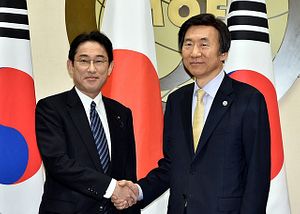On Tuesday, the two top defense and security officials from South Korea and Japan met for the first high-level “two-plus-two” security talks in over five years.
The meeting heralds a thaw in relations between the two Northeast Asian neighbors, both U.S. allies, that remain divided over contentious historical issues, primarily over South Korean perceptions that Japan is inadequately remorseful for atrocities committed on the Korean peninsula during the Second World War.
Specifically, South Korea remains unconvinced of Japanese atonement over wartime brutality including the use of Korean sex slaves, euphemistically known as “comfort women.”
Japan and South Korea are additionally mired in a territorial dispute over the sovereignty of the Liancourt Rocks, otherwise known as Dokdo in South Korea and Takeshima in Japan.
Recently, in its 2015 diplomatic “bluebook,” Tokyo renewed its claim to the islets in the Sea of Japan, drawing protest from the South Korean foreign ministry.
The last time the two sides held such a meeting was in 2009 when they discussed regional security issues, their defense policies, and areas for bilateral cooperation.
The recent meeting comes amid a broader increase in high-level diplomatic interactions in Northeast Asia. Recently, the foreign ministers of China, Japan, and South Korea met for a trilateral dialogue.
Before that, South Korea and Japan agreed to share intelligence with the United States and among themselves over North Korea’s military activities.
At the trilateral with China, the foreign ministers pledged to work toward an eventual resumption of a leader’s summit involving Japanese Prime Minister Shinzo Abe, South Korean President Park Geun-hye, and Chinese President Xi Jinping.
The “two-plus-two” meeting between South Korea and Japan also comes shortly after U.S. Defense Secretary Ashton Carter visited Tokyo to discuss, among other issues, the ongoing revision of the U.S.-Japan defense guidelines.
The revised guidelines will see Japan play a more proactive and global role militarily within the framework of its alliance with the United States.
While the United States is allied with both Japan and South Korea, and would welcome closer bilateral ties between the two countries, it avoids playing the role of an intermediary or of encouraging Seoul and Tokyo to increase their cooperation.
In early 2014, however, U.S. President Barack Obama oversaw the first meeting between Abe and Park at the Nuclear Security Summit in The Hague.
































